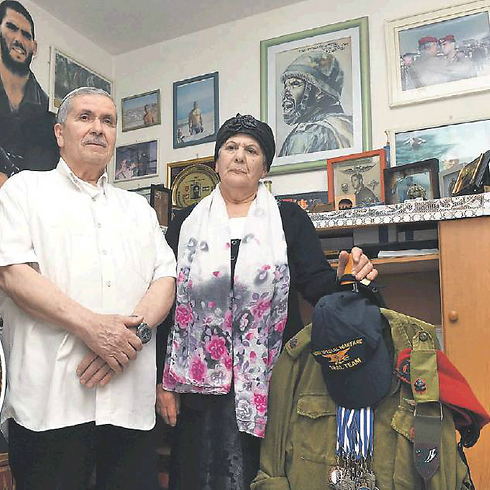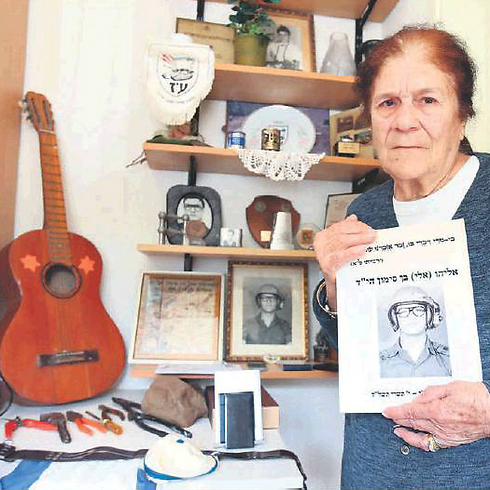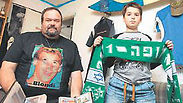
Captain Gilad Stukelman – Second Lebanon War, 2006
A skullcap and prayer book rest on the dresser; a shirt hangs on the old brown wooden stand next to the dusty piano, which hasn't been touched for almost nine years – mute testimony to a life cut short in an instant, the life of Captain Gilad Stukelman.
The second son of Micha and Rachel Stukelman from Timrat in the Jezreel Valley, Gilad enlisted in the Israel Defense Forces in 1998 and opted for the Armored Corps, following in the footsteps of his older brother, Eliran. Following his discharge with the rank of first lieutenant, he traveled in Canada and South America; and on returning to Israel, he secured a job with El Al as a flight attendant.
During the last year of his life, he took up piano lessons, and even managed to purchase a new piano, which now remains unused. "You can see by the dust on the piano that no one plays or even touches it," Rachel painfully explains.
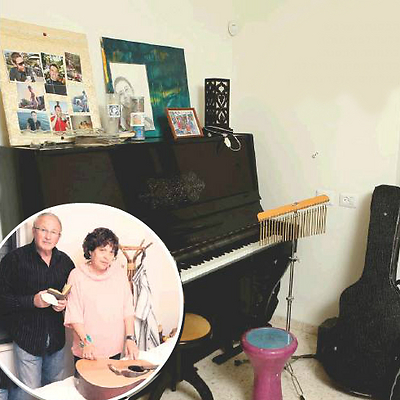
Two display boards rest on top of the piano. The one features a collage of eight photographs of Gilad, a brief story of his life that begins with a picture of him at the age of three and ends with a photograph taken close to the time of his death. The second board shows a portrait of Gilad, drawn with a sensitive and delicate hand.
"Nothing in the room has changed," Rachel says. "I can't bring myself to touch anything. The warm comforter on the bed is still in the same white cover. Before the tragedy, he returned from New York, sat down at the piano, asked my husband to play something with him and scribbled the notes in a notebook. I yelled: 'Soldiers are dying and you're playing?' I stormed out the room and slammed the door behind me."
The following day, Gilad was called up for reserve duty in Lebanon. He was killed five days later, at the age of 26.
Asaf Tzur – suicide bombing, 2003
"Time doesn't heal. To the contrary, the day Asaf was killed, a two-ton weight was placed on my shoulders, and another kilo is added every day. The longing for him doesn't subside. I want to remember every moment of his life and I'm unable to do so."
Yossi Tzur hasn't recovered. On March 5, 2003, a suicide bomber blew himself up on the No. 37 bus in Haifa, killing 17 people, including his 17-year-old son, Asaf (aka Blondi), an eleventh grade student. His room has remained untouched ever since.
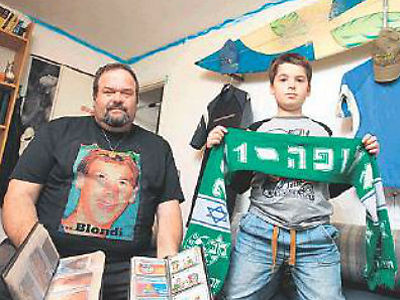
"I'm not sure it's something we planned on doing; it's basically something that just happened," Yossi says. "There's this need to freeze things, to stop time, to go over to the pillow and try to smell his scent. We try to hang on to every little thing – photographs, videos, voice mail recordings, to clutch on to the tiniest thing that can remind us of him. We can no longer hug, kiss, touch, hear him; and his room is the closest thing."
They've even kept a water bottle he drank from. "His lips touched the lips of the bottle. That's our memory from it," Yossi says.
Two and a half years after Asaf was killed, Yossi and Leah welcomed a second son, Eitan, into the world. "Asaf's room isn't locked," Yossi says. "Eitan has known the room since the day he was born. He knows all about his big brother. We share the experiences and memories with him."
Major Ori Azulai – southern Lebanon, 1996
It took Moshe Azulai 19 years to muster up the strength to open and tidy the bedroom closet of his son, Major Ori Azulai, who was killed in southern Lebanon in 1996. He carefully and lovingly folded the pants and shirts, placed them back on the shelves in neat piles, and shut the door again. Nothing was thrown out.
A member of the Sayeret Matkal elite commando unit, and a distinguished officer in the Paratroopers Brigade, Ori Azulai was killed at the age of 26. Some 17 years ago, when the State of Israel marked its 50th birthday, Matilda and Moshe Azulai from Kiryat Shmona lit one of the torches at the traditional Independence Day ceremony, in celebration of the occasion and in memory of their son. They then returned home, to the memories, to Ori's room – which remains unchanged to this very day.
Everything is still there – the uniforms, the flak jacket, the army towels, the army socks, the red Paratroopers boots, maps and folders, leather jackets he used to wear when on duty in the field, pocket flashlights, a long knife in a sheath, an endless number of certificates and letters of praise, photographs with his comrades. And displayed on the closet's glass door are Ori's rank insignia, his Paratroopers wings, his beret, and the toy lion his commands once gave him as a birthday present as a way of telling him that he was a real lion.
The only things that have been added to the room are the numerous medals received by participants in road races held over the years in his memory.
Leaning against the fence in the yard of the house is a heavy Suzuki motorcycle, which served Uri during various operations that will always remain under wraps. The motorcycle is rusty; its wheels have sunk into the earth; and it, too, appears to be grieving. For the motorcycle, like the Azulai family, everything came to an end in that awful split second.
Sergeant Eli Ben-Simon – Yom Kippur War, 1973
Haifa resident Kami Ben-Simon, 80, has held on to her son's personal belongings for the past 42 years. Sergeant Eli Ben-Simon, who served as a tank gunner, was killed on October 6, 1973, during the fierce battles that raged in the Sinai Peninsula. For 10 months, the entire tank crew was considered missing in action, until Eli's body was identified.
"I was nine when my brother was killed," Kobi, Eli's brother, recalls. "Eli and I were very close. We slept in the same room. I saw him as someone to look up to. I used to watch him coming home with his rifle and I was so proud of him."
Kobi will never forget sitting in synagogue with his father, Amram, and hearing the cantor say to the worshippers: Our forces have been attacked. "We looked for Eli in the north, where he was serving; and we didn't even know he had been sent down south," he says.
Amram, the father, passed away some two months ago at the age of 83.
"We looked for him for 10 months," Kami sobs. "I used to go out into the streets to look for my son. I knew he had gone missing in the army, but as a mother I would look for him everywhere. His death is not something you recover from."
When Eli was killed, the family was living on Haifa's HaHashmal Street. Twenty years ago, they moved to the Bat Galim neighborhood, taking all of Eli's belongings with them – his clothes, skullcap, books, tools, and a guitar he built himself at the age of 15.
"I arranged all his things in a room in our house," Kami says. "Everything is in its place and has been kept as it was. I didn't wash the clothes. I love his scent. I will preserve everything he had until the day I die. I miss my son so much."














